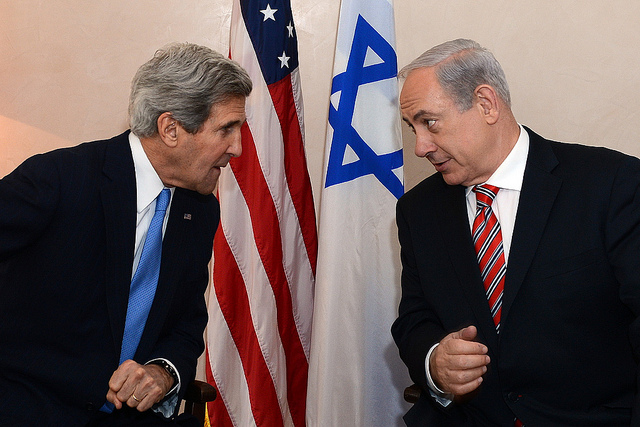by Mitchell Plitnick
Former American diplomat Aaron David Miller is a frequent and worthwhile contributor to US foreign policy discussions in both Washington and the news media. His long career in Middle East diplomacy and strong focus on Israel have enabled him to clarify for the general public the many difficulties that exist under the surface of these issues. Unfortunately, as shown by his recent piece in Foreign Policy magazine, he sometimes obscures them as well.
Miller correctly points out that the Israel-Palestine conflict is not the major source of regional instability and that Secretary of State John Kerry was foolish to imply that the lack of progress on this issue had in some way become a contributing factor to the rise of the group that calls itself the Islamic State. But he also elides the enormous amount of responsibility the United States has and continues to hold not only for the Israel-Palestine conflict itself, but also for the difficulty in making any progress on the issue, let alone resolving it.
Miller states it explicitly: “Washington isn’t responsible for the impasse…The primary responsibility for fixing the problem lies with Israelis and Palestinians, and the lack of resolution is a direct result of their lack of leadership and ownership.”
That is unequivocal nonsense. It adds yet another layer to the enduring myths that surround the long-term lack of progress on this conflict. It is not lack of leadership and ownership that is the problem, it is the massive imbalance of power between the two parties that is the single biggest obstacle to a resolution. And that is an area where the United States is a major factor.
The power imbalance leads to a very simple reality: Israel has very little incentive to compromise. It is a regional superpower militarily, it has by far the most stable government in the Middle East, and it’s a member of the Organization for Economic Cooperation and Development (OECD), with a relatively strong economy. Israelis would undoubtedly prefer a cessation to the Palestinian rocket fire that periodically flares up as it did this past summer, and certainly want to stop incidents such as the one on October 22, when a Palestinian drove into a Jerusalem light rail station, killing an infant and wounding seven other people. But these concerns are not nearly enough to sway Israelis into the sort of compromises that would be bare minimums for a deal with the Palestinians.
From Israel’s point of view, the Palestinians’ minimal demands include a free Gaza and West Bank, including the Jordan Valley, a shared Jerusalem and the recognition of Palestinian refugee rights. In each case, there is a huge risk perceived by the Israelis.
Indeed, because most Israelis believe the narrative telling them that when Israel withdrew from Gaza and Southern Lebanon, all it got in return was rocket fire, they see a similar but much graver risk of that repeated outcome in the West Bank. In fact, most Israelis join their prime minister in rejecting the idea of giving up the Jordan Valley, a huge chunk of the occupied West Bank.
Sharing Jerusalem, and particularly the area of the Temple Mount, conjures fears of the years from 1949-67 when Israelis could not visit the holiest site in Judaism. More than that, Israel’s capture of the Old City in 1967 has become a powerful nationalistic symbol—a compromise on this issue strikes at the very heart of Israeli identity, and that arouses passionate responses.
The refugee question, which I explored in depth recently, is also seen by virtually all Israelis as implying the end of the Jewish State, something they desperately want to avoid. Finally, Israelis remain bitterly divided ideologically on many points, and there is a deep fear that making compromises will set off civil disturbances between secular, religious, nationalist and liberal camps within the country. Recent events around the Gaza war, where demonstrators for peace were repeatedly attacked, give credence to this fear.
The point is not to argue about the legitimacy or realism, or absence thereof, behind any of these fears. They are there, and they must be contended with in some fashion. But that involves confronting those fears, which, in turn, implies that Israelis perceive some pressure—be it military, economic or political—that forces them to take risks. The rewards of peace are, at best, uncertain to Israelis who don’t trust Palestinian intentions and perceive rising militancy in the Arab world and therefore an uncertain future no matter what commitments the current Arab regimes may offer. After all, as many contend, these governments may not be around for long.
Due to its position of relative power, the potential incentives for Israel are negative. The Israeli reaction to the Boycott, Divestment and Sanctions (BDS) campaign, which has not yet had any significant economic effect (though it has certainly altered the public discourse), is a testament to how worried Israel is at the prospect of true economic pressure. The Israeli government’s reaction to the EU’s relatively minor moves to adhere to its own laws regarding partnering on projects in the Occupied Territories and labeling products imported from the West Bank is further proof of this trend.
But whenever Europe, which is an even more indispensable trade partner for Israel than the US, has started to move in this direction, the United States has worked hard behind the scenes to change European minds. In a similar, but far more visible and impactful way, the US has used its veto power repeatedly at the UN Security Council to protect Israel from any consequences of its constant violations of international law. And we do this despite Israel’s defiance of stated US policy in the region.
These are the realities that Miller’s viewpoint elides. They have nothing to do with the Islamic State, and Miller is correct to chide Kerry for trying to tie the two together. But this ongoing hand-wringing about how the Israelis and Palestinians can’t be brought together needs to end. Even more, the nonsensical view that this is due to the personal mistrust between Benjamin Netanyahu and Mahmoud Abbas has to be shunted into the dustbin. Roosevelt and Churchill didn’t trust Stalin at Yalta. Gerry Adams and David Trimble in Northern Ireland didn’t trust each other either, and many of us who were paying attention at the time can remember the constant accusations of bad faith they hurled back and forth, which were very similar to what Netanyahu and Abbas say about each other today. Yet there are also other examples of leaders coming together. It is becoming a cliché, but it is nonetheless true that peace is made between enemies, not between friends, and it is also generally made between parties that neither like nor trust each other.
The reason this is even an issue in the Israel-Palestine conflict is because of the imbalance of power. Because Israel is so powerful and because US policymakers—for reasons that have nothing to do with the Palestinians or the occupation—continue to see Israel as an indispensable ally in security, intelligence and business matters, diplomacy has become ineffective. That’s why we keep hearing excuses for the ongoing failure. Miller makes one of the classic excuses. But it all covers up for US fecklessness and for the fact that, despite the pronouncements, peace between Israel and the Palestinians may be official US policy, but it is not a high priority. Kerry, in a credit to his character and his naiveté, tried to buck this, but found that he didn’t have the diplomatic tools he thought he had.
For all of these reasons, the US bears an enormous responsibility for the ongoing and deepening conflict in Israel and the Occupied Territories. And yet, that doesn’t mean the US needs to be doing more to resolve it.
On the contrary, the US needs to do less. The American commitment to Israel’s military superiority is now law, but even without that, the ties between the US and Israeli militaries, intelligence communities and businesses are extremely deep. There is no realistic path to undoing these ties.
But that doesn’t mean the United States has to keep acting to thwart European efforts to raise the price of its occupation for Israel. Nor does it mean that the US has to keep running interference for Israel at the UN Security Council. Most of all, it does not mean that the US has to keep insisting on its exclusive role as the mediator of this conflict.
If the United States simply refrains from doing these things, and takes no other action to pressure Israel, the change in the status quo would be enormous. But that would, itself, be a major shift in US policy on the ground. And it is not going to happen as long as we delude ourselves into believing the status quo is not our fault and that we bear no responsibility for changing it.






Again Mr Plitnick, interesting post. IMHO, the last paragraph sums it all up. How such can/could come about, is open to many different directions, though if the U.S. is really about a “Nation of Laws”, then the congress needs to stop the double standard it uses in applying such laws. I’m referring to lobbyists giving those bags full of money to sway-bribe-votes, which corrupts the system in favor of the few vs the majority, which the Supreme Court legalized. Whether this will come to about, remains to be seen. Let Israel stand on its own 2 feet without the U.S. to back every play, for like the spoiled child whose parents always bails it out of trouble, doesn’t learn any lessons other than being bailed out, Israel will continue doing what it’s doing now and nothing will change.
Another interesting result of power imbalance is that the weaker side tends to resort to “terrorist” acts as the only available response, such as the recent case where a car was driven into pedestrians resulting in the death of a 2 year old child. While I do not condone any form of murder, It seems to me that it is easier to portray this as shocking, while the death and maiming of children as a result of Israels incursion, is dismissed as an unfortunate side effect of a legitimate act of “defense.”
“We do not target civilians” is such a blatantly transparent half-truth………
I think Israel comprehends that the Palestinians comprehend there will be no deal if right of return is a sine qua non provision of the deal.
Sadly, the US in effect has encouraged Israel to grow its illegal colonies in the West Bank and to make it more difficult to achieve a deal with occupied Palestine.